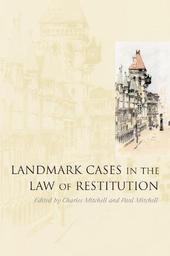
|
Landmark Cases in the Law of Restitution
Hardback
Main Details
| Title |
Landmark Cases in the Law of Restitution
|
| Authors and Contributors |
Edited by C Mitchell
|
|
Edited by Paul Mitchell
|
| Series | Landmark Cases |
|---|
| Physical Properties |
| Format:Hardback | | Pages:416 | | Dimensions(mm): Height 234,Width 156 |
|
| ISBN/Barcode |
9781841135885
|
| Classifications | Dewey:346.41029 |
|---|
| Audience | | Undergraduate | | Postgraduate, Research & Scholarly | | Professional & Vocational | |
|---|
|
Publishing Details |
| Publisher |
Bloomsbury Publishing PLC
|
| Imprint |
Hart Publishing
|
| Publication Date |
18 April 2006 |
| Publication Country |
United Kingdom
|
Description
It is now well established that the law of unjust enrichment forms an important and distinctive part of the English law of obligations. Restitutionary awards for unjust enrichment and for wrongdoing are clearly recognised for what they are. But these are recent developments. Before the last decade of the twentieth century the very existence of a separate law of unjust enrichment was controversial, its scope and content matters of dispute. In this collection of essays, a group of leading scholars look back and reappraise some of the landmark cases in the law of restitution. They range from the early seventeenth century to the mid-twentieth century, and shed new light on some classic decisions. Some argue that the importance of their case has been overstated; others, that it has been overlooked, or misconceived. All persuasively invite the reader to think again about some well-known authorities. The book is an essential resource for anyone, scholar, student or practitioner, with an interest in this fascinating area of the law.
Author Biography
Charles Mitchell is a Professor of Law at King's College London. He is the author of, The Law of Contribution and Reimbursement (OUP, 2003) and co-author of Hayton and Marshall's Commentary and Cases on the Law of Trusts and Equitable Remedies 12th edn (Sweet Maxwell, 2005). Paul Mitchell is a Senior Lecturer in Law at King's College London and the author of The Making of the Modern Law of Defamation (Hart, 2005).
Reviews...useful insights into the role some cases played in bringing the law of restitution to where it is today... -- David Capper * Restitution Law Review * ...a fine example of the kind of historical investigation that should be the foundation of all common law scholarship...These essays should be read not just by legal historians or restitution lawyers but also those interested in the workings of the common law generally. -- Tariq A Baloch * King's Law Journal, Volume 18, Issue 1 * Many of the essays contain a detailed account of the story behind the case and make highly entertaining reading. They recount facts which are not found in the law reports but are the product of wide-ranging and painstaking research...some essays are highly entertaining tales of ancient skulduggeries, others indispensable guides to difficult but important cases. If we are to understand the present law, we need to learn from our predecessors' mistakes, and these are thoroughly investigated in this volume. -- Lord Millett * The Law Quarterly Review, Volume 123 * The legal historian will enjoy reading those essays that are deeply historical, involving a detailed examination of the facts of particular cases, far beyond the analysis of the facts in the reports of those cases. The practitioner will enjoy reading those chapters that discuss cases that remain of present importance, or which place an historical analysis of an old case in a present day context....All in all, this book shows how valuable the work of jurists in the academies can be. Fascinating and important insights are revealed when a magnifying glass is placed over a small part of the law, and the detail that is revealed by that focus is then viewed in a wider context. Sometimes the results of those endeavours capture historical detail that would otherwise be lost. On other occasions, the enormous amount of work performed by academic jurists plays an important role in the development of modern legal principles. All of the essays in this book do at least one of these things, and some of them do both. -- Jonathon Moore * Journal of Equity *
|